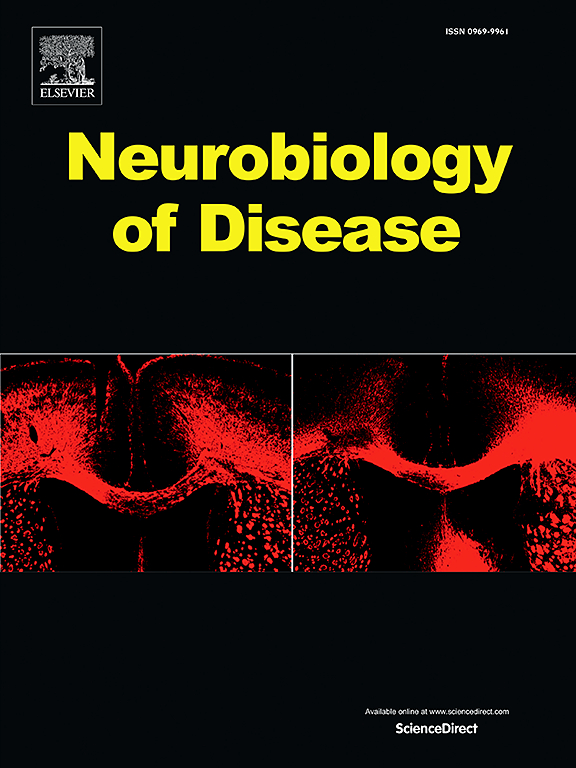Deficits in taste-guided behaviors and central processing of taste in the transgenic TDP-43Q331K mouse model of frontotemporal dementia
IF 5.1
2区 医学
Q1 NEUROSCIENCES
引用次数: 0
Abstract
Frontotemporal dementia (FTD) is the second most prevalent form of presenile dementia. Patients with FTD show prominent chemosensory symptoms such as abnormal detection and recognition thresholds for various gustatory stimuli. The chemosensory symptoms of FTD may be related to damage of the gustatory insular cortex (GC) as the insular cortex is one of the primary targets in FTD disease progression. Little is known about how circuitry changes in GC lead to deficits in taste processing in FTD. Here we tested the hypothesis that gustatory deficits are present in a mouse model of FTD, and that they are related to abnormal patterns of neural activity in GC. We behaviorally evaluated a transgenic FTD mouse model overexpressing human TDP-43 with a Q331K mutation (TDP-43Q331K) in a brief access test and a taste-based two alternative forced choice (2AFC) task probing the ability to discriminate sucrose/NaCl mixtures. TDP-43Q331K mice showed abnormal sucrose consumption and an impaired ability to discriminate taste mixtures compared to non-transgenic control mice. To assess deficits in GC taste processing, we relied on electrophysiological recordings using chronically implanted tetrodes in alert TDP-43Q331K and non-transgenic control mice. The proportion of taste-selective neurons in TDP-43Q331K mice decreased over time compared to control mice. Similarly, encoding of chemosensory information and processing of taste palatability were impaired in TDP-43Q331K mice compared to control mice. Overall, these results demonstrate taste-related symptoms in a mouse model of FTD and provide evidence for altered taste processing in GC of TDP-43Q331K mice compared to control mice.
额颞叶痴呆症(FTD)是第二大先兆痴呆症。FTD患者表现出明显的化学感觉症状,如对各种味觉刺激的检测和识别阈值异常。FTD的化学感觉症状可能与味觉岛叶皮层(GC)受损有关,因为岛叶皮层是FTD疾病进展的主要目标之一。人们对 GC 的电路变化如何导致 FTD 味觉处理缺陷知之甚少。在此,我们测试了一个假设,即在 FTD 小鼠模型中存在味觉缺陷,而且这种缺陷与 GC 神经活动的异常模式有关。我们对过量表达 Q331K 突变的人类 TDP-43 的转基因 FTD 小鼠模型(TDP-43Q331K)进行了行为学评估,该模型接受了简短的访问测试和基于味觉的双替代强迫选择(2AFC)任务,以探究其分辨蔗糖/氯化钠混合物的能力。与非转基因对照组小鼠相比,TDP-43Q331K 小鼠表现出异常的蔗糖消耗和味觉混合物分辨能力受损。为了评估 GC 味觉处理的缺陷,我们在警觉的 TDP-43Q331K 小鼠和非转基因对照小鼠体内使用长期植入的四极杆进行电生理记录。与对照组小鼠相比,TDP-43Q331K 小鼠味觉选择性神经元的比例随着时间的推移而下降。同样,与对照组小鼠相比,TDP-43Q331K 小鼠的化学感觉信息编码和味觉可口性处理也受到了损害。总之,这些结果表明了 FTD 小鼠模型中与味觉相关的症状,并提供了与对照组小鼠相比 TDP-43Q331K 小鼠 GC 中味觉处理发生改变的证据。
本文章由计算机程序翻译,如有差异,请以英文原文为准。
求助全文
约1分钟内获得全文
求助全文
来源期刊

Neurobiology of Disease
医学-神经科学
CiteScore
11.20
自引率
3.30%
发文量
270
审稿时长
76 days
期刊介绍:
Neurobiology of Disease is a major international journal at the interface between basic and clinical neuroscience. The journal provides a forum for the publication of top quality research papers on: molecular and cellular definitions of disease mechanisms, the neural systems and underpinning behavioral disorders, the genetics of inherited neurological and psychiatric diseases, nervous system aging, and findings relevant to the development of new therapies.
 求助内容:
求助内容: 应助结果提醒方式:
应助结果提醒方式:


